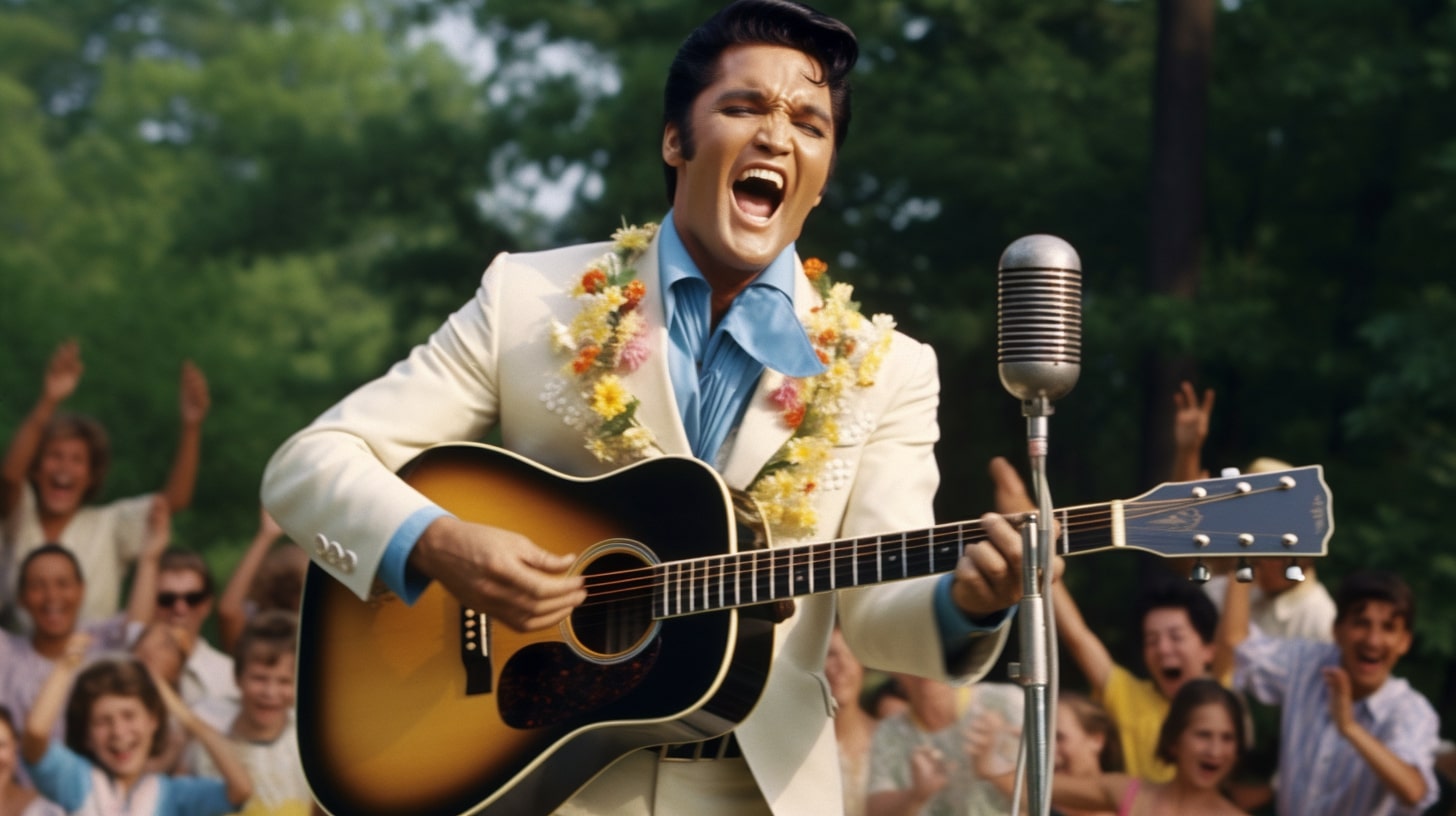Elvis Presley, the “King of Rock and Roll,” is widely known for his unique voice and captivating stage presence. However, he was also a talented musician who played a range of instruments. Despite being unable to read or write music, Elvis had a natural aptitude for music and possessed an incredible ear for picking up songs after just one listen.
Today, Elvis Presley’s legacy and influence continue to be celebrated and explored by generations of music enthusiasts, and to fully appreciate his musical talent, let’s delve deeper into the instruments that Elvis Presley played.
Contents
Instruments Elvis Played
Guitar
Elvis Presley was known for playing several musical instruments, but the guitar was his primary instrument. He started playing guitar at a young age and received his first guitar as a birthday gift. Throughout his career, he used various guitars, both acoustic and electric, for his performances and in films.
Elvis was not considered an accomplished musician by professional standards, as he didn’t read or write music. However, he had a remarkable sense of rhythm and timing, which made his guitar playing stand out. Initially, he played as a rhythm guitarist, providing accompaniment for his own singing.
Piano and Drums
Besides the guitar, Elvis also played piano and drums. Although he had no formal lessons, he was a natural musician with the ability to play by ear. This meant he could hear a song, sit on a piano or drum set, and start playing without needing sheet music. His proficiency in these instruments can be heard in some of his recorded pieces and live performances.
Ukulele and Accordion
During his career, Elvis also toyed with other instruments like the ukulele and accordion. Though he may not have been as proficient in these instruments as the guitar, piano, or drums, his musical talent allowed him to experiment and explore different sounds. Elvis’s ability to play a range of instruments demonstrated his versatility and passion for music.
In conclusion, Elvis Presley was a gifted musician capable of playing various instruments, most notably the guitar, piano, and drums. His natural talent for rhythm and timing set him apart from other artists of his time and contributed to his iconic status in the world of music.
Presley’s Guitars and Gear
Acoustic Guitars
Elvis Presley was known for playing several acoustic guitars throughout his career. Notably, he often used Martin guitars, such as the Martin D-18 and Martin D-28. These guitars were popular due to their rich and full-bodied sound.
Elvis was also frequently seen playing the Gibson J-200, another iconic acoustic guitar. This model is recognizable for its large body, distinctive inlays, and signature pickguard design.
Electric Guitars
When it comes to electric guitars, Elvis was particularly fond of the Fender Telecaster and the Gretsch brand. The Fender Telecaster, with its solid body and bright sound, became a staple instrument for rock and roll musicians. The Gretsch electric guitars also provided a unique sound and look, especially with their signature semi-hollow body designs.
Bass Guitars
Although Elvis was not primarily known for playing bass guitar, he occasionally played the Fender Precision Bass. This model, often called the “P-bass,” set the standard for electric bass guitars with its smooth playability and versatile tone. The Fender Precision Bass was a staple for musicians across various genres, including rock and roll, jazz, and blues.
Other Gear
In addition to his guitar collection, Elvis also dabbled with other instruments, such as piano, drums, accordion, and ukulele. Elvis’s first guitar, an acoustic model, was allegedly purchased from the Tupelo Hardware Store by his mother as a birthday gift.
While Elvis Presley played a range of instruments, his association with iconic guitars like the Martin and Gibson acoustics and Fender and Gretsch electrics shaped his image as a rock and roll pioneer. These instruments played a major role in defining the sound and impact of his legendary performances.
Significant Performances and Recordings
Sun Recording Sessions
Elvis Presley began his music career with the Sun Records label, working closely with Sam Phillips, the label’s founder. During this time, Elvis recorded several iconic songs that would later go on to define his career. Along with his bandmates, Bill Black on bass and Scotty Moore on guitar, Elvis combined elements of blues, country, and R&B, which would help forge his unique sound.
Some notable recordings from this era include “That’s All Right,” “Blue Moon of Kentucky,” and “Good Rockin’ Tonight.” These sessions were instrumental in shaping the rock and roll genre and influenced later artists such as The Beatles and Led Zeppelin.
Film and Television Performances
Elvis Presley had an equally successful career in films, starring in 31 feature films and two documentaries. His film roles allowed him to showcase his musical talents, often performing songs in his movies. One such iconic performance is the “Jailhouse Rock” sequence from the 1957 film of the same name, which has become one of his most recognizable dance scenes. His films also introduced some of his best-known songs to the public, such as “Love Me Tender,” “Can’t Help Falling in Love,” and “Viva Las Vegas.”
In addition to his film career, Elvis was a frequent guest on television shows, most notably his performances on “The Ed Sullivan Show” and “The Milton Berle Show.” These shows were instrumental in popularizing Presley and his music, contributing to his immense influence on pop culture during the 1950s and 1960s.
’68 Comeback Special
After a period of declining popularity in the 1960s, Elvis made a triumphant return to the music scene with the 1968 NBC television special, commonly referred to as the “’68 Comeback Special.” This groundbreaking live performance featured Elvis in a more intimate setting, surrounded by a small audience. He showcased his musical versatility by playing several instruments, including guitar, piano, and drums.
The ’68 Comeback Special revitalized Elvis’ career and produced some memorable live performances, such as “Heartbreak Hotel,” “Hound Dog,” and the legendary “If I Can Dream,” which concluded the show. The special’s success led to several chart-topping albums and a return to live performances for Elvis, including his famed residency in Las Vegas. This period of renewed fame also saw the release of albums like “From Elvis in Memphis,” which included the hit track “Suspicious Minds.”
The ’68 Comeback Special stands as a testament to the significance of Elvis Presley’s influence on music history and pop culture.
Collaborators and Musical Cohorts
Scotty Moore and Bill Black
Elvis Presley’s early collaborations included guitarist Scotty Moore and bassist Bill Black. These musicians played a significant role in shaping Elvis’ sound and stage presence, with Moore’s lead guitar work defining the rockabilly genre.
Moore initially mentioned that Presley was not an accomplished musician, yet he possessed an uncanny sense of timing and rhythm. Black was a vital group member, providing a solid and energetic foundation for Elvis’ performances.
Chet Atkins and Johnny Smith
As Elvis’ career progressed, he collaborated with great musicians like Chet Atkins and Johnny Smith. Chet Atkins, a talented guitarist and record producer, worked closely with Elvis on several occasions, contributing to the King of Rock and Roll’s distinct sound. On the other hand, Johnny Smith was an influential jazz guitarist whose innovative chord voicings inspired the development of Elvis’ later guitar-playing style.
Jesse Lee Denson and Jerry Lee Lewis
Another crucial collaboration in Elvis’ career was with Jesse Lee Denson, a singer, and guitarist who introduced him to the principles of blues and soul music. Denson helped Elvis explore a different aspect of his musicality, adding depth to his performances.
Furthermore, the explosive piano playing of Jerry Lee Lewis also influenced Elvis’ music. Lewis, often considered one of the pioneers of rock and roll, shared a common thread with Elvis as they both contributed to the musical revolution of the 1950s.
Throughout his career, Elvis Presley collaborated with various talented musicians who greatly impacted his sound and growth as a performer. These individuals played vital roles in shaping the musical legacy surrounding Elvis’ name, leaving indelible marks on his life and music.
Elvis Presley’s Influence on The Music’s Culture and History
Influence on Future Musicians
Elvis Presley, born on January 8, 1935, in Tupelo, Mississippi, played a significant role in shaping the music, culture, and style of the 20th century. His unique stage performances and versatile music and acting skills made him an influential figure in the country, rock and roll, and gospel music genres.
From an early age, Elvis showed interest in music, learning to play the guitar and participating in the choir at the First Assembly of God Church. He later moved to Memphis, Tennessee, where he absorbed various musical styles, further developing his unique style.
A talented performer, Elvis strived to captivate audiences with his signature moves and artistic flair. His innovative picking and timing techniques revolutionized the music industry, inspiring several musicians worldwide to follow in his footsteps.
Legacy and Contributions to Music
Presley’s musical talent was not limited to his outstanding guitar skills. As a pianist and singer, he masterfully blended different genres, leaving a lasting impression on the music industry. His “unique style” became synonymous with Elvis and is still emulated by musicians today.
His iconic performances, such as the ’68 Comeback Special, showcased his ability to adapt to changing musical trends and captivate audiences with his powerful stage presence. Elvis’s talents extended beyond music, as he also had a fruitful acting career, starring in films like “Jailhouse Rock” and “Blue Hawaii.”
Most importantly, Presley’s intuitive understanding of rhythm and melody allowed him to excel in his career, despite not formally studying music. His collaborations with various artists, such as pianist Floyd Cramer and drummer D.J. Fontana, contributed to his long-lasting appeal.
Elvis achieved numerous accolades and honors throughout his career for his musical contributions. Some of these accomplishments include being inducted into the Rock and Roll Hall of Fame in 1986 and winning multiple Grammy Awards in 1967, 1972, and 1974.
Today, Elvis Presley’s Graceland Mansion serves as a reminder of his impact on the music and cultural landscape. Millions of fans worldwide continue to visit Graceland, paying tribute to “The King” and his profound influence on music and history.


